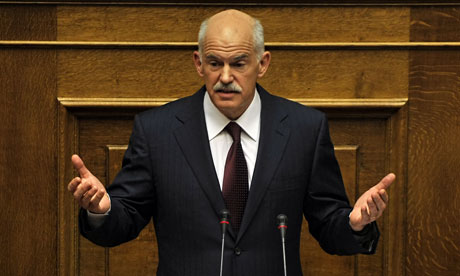guardian.co.uk, Tuesday 24 January 2012 16.42 GMT
Corruption must be tackled, but when the Greek people turn the TV off they will realise injustice goes beyond a few rotten apples
Two public prosecutors have expressed intent to investigate the possible criminal responsibilities of George Papandreou. Photograph: Louisa Gouliamaki/AFP/Getty
The images beamed through Greek TV sets have now become a familiar: they show once-powerful, established members of the Greek business world escorted in handcuffs, accused of dodging millions of euros in tax. And on Sunday, as part of an attempt to combat rampant tax evasion, the Greek government published a list naming 4,152 major tax dodgers. The evaders, who had been forewarned to either pay up or risk being named and shamed, appear to owe the state a total of €14.877bn.
In principle, the idea sounds rational and appealing, even: those who profiteered extortionately in the glory days of Greece's capitalist euphoria would finally become accountable, even pay up for their crimes. And yet, this is not the case. Other similar naming and shaming campaigns have been organised in the past few months, only to be forgotten soon afterwards. All these names are far from exceptions in the financial and political bodies, only concrete evidence that so much is rotten in the state of Greece. Were those individuals tried, did they finally pay up their debts, and were governmental funds raised as a result? Nobody has the whole picture, nobody knows – this is just a propaganda trick unfolded before a major restructuring of the country's financial life, which will reinforce the liberalisation of many private sector industries and be accompanied by major labour law changes that will allow further dramatic national cuts.
Since the legal loopholes that structurally allowed – encouraged, even – tax evasion to take place have remain intact, those who bear responsibility for the inconceivable state of the country – the institutions, practices and most importantly much of Greece's political elite – are still currently enjoying their immunity. They still, however, pontificate on morals on our TV screens.
The deeply entrenched feeling of injustice already felt by the Greeks is only increased by a series of taxation policies against personal income that makes bare survival questionable for too many at a time when thousands become unemployed on a daily basis. And it only gets worse: with our social insurance system crippled, as well as hospitals and schools being chronically underfunded, many are losing access to education, care and preventive services. Their only choice, if they can afford it, is to turn to the private sector for basic living amenities.
In response to an expressed intent by two public prosecutors to investigate the possible criminal responsibilities of ex-prime minister George Papandreou and his finance minister Giorgos Papakonstantinou (they suspect the swelling of Greece's public deficit figures in order to trigger a troika intervention), the current minister of health Andreas Loverdos declared that "whoever was to attempt to challenge Papandreou's political choices would be leading the country to carnage". What his words actually mean is that there is a limit in the attribution of justice and, thus, to citizens' equality.
For the time being, famous people are getting caught while journalists speak in economistic terms people do not understand – Greek people remain detached from the dramatic headlines describing their country's economy. But as they switch off their TVs, they immediately return to their impossible survival, their fear and despair. No one can deny that privileges and corruption must be tackled, and that citizens' responsibility must be addressed. And yet, it seems that this cheap tax-dodging soap opera production is less about creating a new citizenship ethos, and more about keeping a poverty-stricken populace lethargic.
This is not entirely working, however. In the past few months, members of parliament have been attacked by enraged passersby when attempting to mingle in their constituency. People on the ground feel more alienated by the day, caught in the headlights of catastrophic restructuring measures. And as this happens, the political elite appears ever fearful that people could gaze beyond the rotten apples to see the system's injustice as a whole.
![The [Greek] European Tragedy](https://blogger.googleusercontent.com/img/b/R29vZ2xl/AVvXsEiWKI5s90SFm1wWTk6bs4p7CgslaC2SnYPsrZhb-B-smOufNNCSxCvpBLI9hOB-LsXZjir_PNmEiMk2-E62F3xkg96IoC6QFAaZAnPRTVH340IN9WBRmWJqPkjWlgyRj3zpALp7h6hvA58/s920/GkBack_new.jpg)
